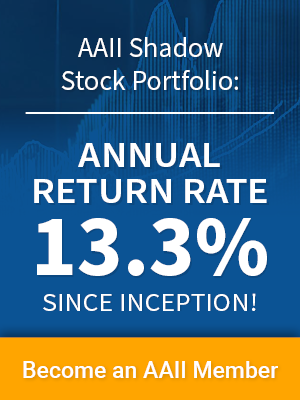Based on key financial metrics such as the price-to-sales ratio, shareholder yield and the price-earnings ratio, the following 3 stocks made the list for top value stocks in the Household Durables industry. Those looking for value stocks to add to their portfolio may want to use this list as a starting point for further investment research.
Why Focus on Undervalued Household Durables Stocks?
Value investors seek to buy stocks at a discount to their intrinsic value. Long-term returns show that such strategies are advantageous. Value stocks, as a group, tend to outperform growth stocks over extended periods of time. Typically, value investors perform financial analysis of numerous metrics, don’t follow the herd and are long-term investors.
AAII’s A+ Investor Value Grade is derived from a stock’s Value Score. The Value Score is the percentile rank of the average of the percentile ranks of the price-to-sales ratio, price-earnings ratio, enterprise-value-to-EBITDA (EV/EBITDA) ratio, shareholder yield, price-to-book-value ratio and price-to-free-cash-flow ratio. The score is variable, meaning it can consider all six ratios or, should any of the six ratios not be valid, the remaining ratios that are valid. To be assigned a Value Score, stocks must have a valid (non-null) ratio and corresponding ranking for at least two of the six valuation ratios.
What Goes Into AAII’s Value Grade?
Stock evaluation requires access to huge amounts of data as well as the knowledge and time to sift through it all, make sense of financial ratios, read income statements and analyze recent stock movement. AAII created A+ Investor, a robust data suite that condenses data research in an actionable and customizable way suitable for investors of all knowledge levels, to help investors with that task.
AAII’s proprietary stock grades come with A+ Investor. These offer intuitive A–F grades for more than just value. It is possible for a stock to appear cheap based on one valuation metric but appear expensive on another. It is also possible for one valuation ratio to be associated with outperforming stocks during certain periods of time but not others. Some stocks may even have null values for certain metrics like the price-earnings ratio or the price-to-book ratio but not others. An example of this would be a company with losses instead of profits or a negative book value because of heavy borrowing. Negative earnings or book value result in non-meaningful ratios that are left blank or null.
Click the button below to learn more about A+ Investor and subscribe today.

3 Undervalued Household Durables Stocks
Of course, there are countless value stocks that are worth mentioning, but this is a concise list of the top 3 undervalued stocks in the Household Durables industry for Tuesday, November 18, 2025. Let’s take a closer look at their individual scores to see how they measure up against each other and the Household Durables industry median.
| Company | Ticker | Price/Sales | Price/Earnings | EV/EBITDA | Shareholder Yield | Price/Book Value | Price/Free Cash Flow | Value Grade |
| Hovnanian Enterprises, Inc. | HOV | 0.23 | 5.4 | 8.2 | 1.2% | 0.94 | 7.0 | A |
| Legacy Housing Corporation | LEGH | 2.55 | 9.8 | 10.3 | 1.2% | 0.88 | 24.9 | B |
| M/I Homes, Inc. | MHO | 0.75 | 7.3 | 7.2 | 4.0% | 1.03 | 13.8 | A |
The Value Grade is assigned based on how each stock’s composite valuation compares to all other stocks.
The process for assigning grades starts with each variable for a given stock. The percentile rankings for all valid ratios that a stock has are calculated. So, for instance, a stock could have a price-to-book ranking in the 43rd percentile, a price-earnings ranking in the 67th percentile, a price-to-sales ranking in the 23rd percentile, etc. Then, those rankings are averaged for each stock. (A minimum of two valid variables are required, though all six will be used if available.)
Once the average of the individual variables is calculated, that average is ranked against all stocks. Put another way, each stock’s composite valuation is compared to all other stocks. These ranks are then sorted into quintiles from the cheapest 20% (a grade of A) to the most expensive 20% (a grade of F).
As always, we recommend that you conduct proper due diligence and research before investing in any security. We also suggest that investors utilize numerous grades, not just value, when it comes to deciding whether a company is a good fit for their allocation needs.
Hovnanian Enterprises, Inc.’s Value Grade
Value Grade:
| Metric | Score | HOV | Industry Median |
| Price/Sales | 10 | 0.23 | 0.61 |
| Price/Earnings | 5 | 5.4 | 10.8 |
| EV/EBITDA | 25 | 8.2 | 11.1 |
| Shareholder Yield | 37 | 1.2% | 2.2% |
| Price/Book Value | 24 | 0.94 | 1.20 |
| Price/Free Cash Flow | 16 | 7.0 | 16.4 |
Hovnanian Enterprises, Inc., through its subsidiaries, designs, constructs, markets, and sells residential homes in the United States. It offers single-family detached homes, attached townhomes and condominiums, urban infill, and active lifestyle homes with amenities, such as clubhouses, swimming pools, tennis courts, tot lots, and open areas. The company markets and builds homes for first-time buyers, move-up buyers, luxury buyers, active lifestyle buyers, and empty nesters. It also provides mortgage loans and title services. Hovnanian Enterprises, Inc. was founded in 1959 and is headquartered in Matawan, New Jersey.
Stocks with a Value Score from 81 to 100 are considered deep value, those with a score between 61 and 80 are value and so on.
Hovnanian Enterprises, Inc. has a Value Score of 96, which is considered to be undervalued.
When you look at Hovnanian Enterprises, Inc.’s price-to-sales ratio at 0.23 compared to the industry median at 0.61, this company has a lower price relative to revenue compared to its peers. This could make Hovnanian Enterprises, Inc.’s stock more attractive for value investors.
Hovnanian Enterprises, Inc.’s price-earnings ratio is 5.40 compared to the industry median at 10.75. This means it has a lower share price relative to earnings compared to its peers. This could make Hovnanian Enterprises, Inc. more attractive for value investors.
Now, let’s assess Hovnanian Enterprises, Inc.’s EV/EBITDA ratio, also known as enterprise multiple. At 8.2, when compared to the industry median of 11.1, the company may be considered undervalued in relation to its peers. Value investors could use the enterprise multiple to identify stocks that are considered overvalued or undervalued relative to their industry.
Shareholder yield is the sum of a stock’s dividend yield (paid over previous 12 months minus special dividends) and the percentage of net share buybacks over the previous 12 months. Hovnanian Enterprises, Inc.’s shareholder yield is lower than its industry median ratio of 2.15%. Value investors may look for an attractive shareholder yield because it can be a powerful tool for identifying if the company has a good management team.
As one of the most common value metrics, the price-to-book ratio evaluates a company’s current market price relative to its book value. Hovnanian Enterprises, Inc.’s price-to-book ratio is lower than its industry median ratio of 1.20. This could make Hovnanian Enterprises, Inc. more attractive to investors looking for a new addition to their portfolio.
Lastly, let’s take a look at Hovnanian Enterprises, Inc.’s price-to-free-cash-flow ratio (P/FCF), which can indicate a company’s market value relative to its operating cash flow. Hovnanian Enterprises, Inc.’s price-to-free-cash-flow ratio is lower than its industry median ratio of 16.40. This could make Hovnanian Enterprises, Inc. more attractive because the lower P/FCF ratio indicates that Hovnanian Enterprises, Inc. is undervalued. The P/FCF ratio metric can also be viewed over a long-term time frame to see if the company's cash flow to share price value is generally improving or worsening.
Legacy Housing Corporation’s Value Grade
Value Grade:
| Metric | Score | LEGH | Industry Median |
| Price/Sales | 59 | 2.55 | 0.61 |
| Price/Earnings | 18 | 9.8 | 10.8 |
| EV/EBITDA | 37 | 10.3 | 11.1 |
| Shareholder Yield | 37 | 1.2% | 2.2% |
| Price/Book Value | 21 | 0.88 | 1.20 |
| Price/Free Cash Flow | 61 | 24.9 | 16.4 |
Legacy Housing Corporation engages in the building, sale, and financing of manufactured homes and tiny houses primarily in the southern United States. The company manufactures and provides for the transport of mobile homes, including 1 to 5 bedrooms with 1 to 3 1/2 bathrooms; and provides wholesale financing to dealers and mobile home parks, as well as retail financing to consumers. It also offers inventory financing for its independent retailers; consumer financing for its products; and financing to manufactured housing community owners that buy or lease its products for use in their rental housing communities. The company is involved in financing and developing new manufactured home communities. It markets its homes under the Legacy brand through a network of independent retailers and company-owned stores; and directly to manufactured home communities. The company was founded in 2005 and is headquartered in Bedford, Texas.
Stocks with a Value Score from 81 to 100 are considered deep value, those with a score between 61 and 80 are value and so on.
Legacy Housing Corporation has a Value Score of 66, which is considered to be undervalued.
Legacy Housing Corporation’s price-earnings ratio is 9.8 compared to the industry median at 10.8. This means that it has a lower price relative to its earnings compared to its peers. This makes Legacy Housing Corporation more attractive for value investors.
Legacy Housing Corporation’s price-to-book ratio is higher than its peers. This could make Legacy Housing Corporation less attractive for value investors when compared to the industry median at 1.20.
You can read more about Legacy Housing Corporation’s key financial metrics like shareholder yield, price-to-free-cash-flow and EV/EBITDA ratio, or learn more about its Momentum and Growth Grades, by subscribing to A+ Investor.
M/I Homes, Inc.’s Value Grade
Value Grade:
| Metric | Score | MHO | Industry Median |
| Price/Sales | 27 | 0.75 | 0.61 |
| Price/Earnings | 9 | 7.3 | 10.8 |
| EV/EBITDA | 19 | 7.2 | 11.1 |
| Shareholder Yield | 21 | 4.0% | 2.2% |
| Price/Book Value | 28 | 1.03 | 1.20 |
| Price/Free Cash Flow | 37 | 13.8 | 16.4 |
M/I Homes, Inc., together with its subsidiaries, engages in the construction and sale of single-family residential homes in Ohio, Indiana, Illinois, Minnesota, Michigan, Florida, Texas, North Carolina, and Tennessee. The company operates through Northern Homebuilding, Southern Homebuilding, and Financial Services segments. It also designs, constructs, markets, and sells single-family homes and attached townhomes to first-time, millennial, move-up, empty-nester, multi-generational, and luxury homebuyers under the M/I Homes brand name. In addition, the company purchases undeveloped land to develop into developed lots for the construction of single-family homes, as well as for sale to others. Further, it originates and sells mortgages; and serves as a title insurance agent by providing title insurance policies, examination, and closing services to purchasers of its homes. The company was founded in 1976 and is based in Columbus, Ohio.
Stocks with a Value Score from 81 to 100 are considered deep value, those with a score between 61 and 80 are value and so on.
M/I Homes, Inc. has a Value Score of 92, which is considered to be undervalued.
M/I Homes, Inc.’s price-earnings ratio is 7.3 compared to the industry median at 10.8. This means that it has a lower price relative to its earnings compared to its peers. This makes M/I Homes, Inc. more attractive for value investors.
M/I Homes, Inc.’s price-to-book ratio is higher than its peers. This could make M/I Homes, Inc. less attractive for value investors when compared to the industry median at 1.20.
You can read more about M/I Homes, Inc.’s key financial metrics like shareholder yield, price-to-free-cash-flow and EV/EBITDA ratio, or learn more about its Momentum and Growth Grades, by subscribing to A+ Investor.

Other Household Durables Stock Grades
Value is just one of the five Stock Grades included in our A+ Investor service. AAII members can see the top-graded stocks—those with grades of A or B for value, growth, momentum, earnings estimate revisions and quality—on the A+ Stock Grades Screener.
Also, if you want full access to all of AAII’s premium services, you can subscribe to one convenient bundled plan called AAII Platinum where you can try out A+ Investor, AAII Dividend Investing, the Stock Superstars Report, Growth Investing and VMQ Stocks. With the other premium services, you can dive deep into additional metrics, portfolios, commentary and information about Household Durables stocks as well as other industrys.
Choosing Which of the 3 Best Household Durables Stocks Is Right for You
Choosing which value stocks to invest in will ultimately depend on your individual goals and allocation; however, comparing similar value stocks in the same industry can help you analyze which might be better investments for you in the long run. So, let’s take a look at the Value Grade for all of our stocks.
- Hovnanian Enterprises, Inc. stock has a Value Grade of A.
- Legacy Housing Corporation stock has a Value Grade of B.
- M/I Homes, Inc. stock has a Value Grade of A.
Now that you have a bit more background about each of the 3 undervalued stocks in the Household Durables industry as well as their overall grades, it’s time for you to conduct additional research to see if these could fit your portfolio needs based on your goals and risk tolerance. AAII can help you figure out both and identify which investments align with what works best for you.
We do so through a program of education that teaches you to invest for yourself and become an effective manager of your own wealth—no more relying on others for your financial independence. You can rely on AAII for timeless articles on financial planning and stock-picking, unbiased research and actionable analysis that makes you a better investor.
A+ Investor adds to that qualitative teaching by giving you a powerful data suite that helps you whittle down investment decisions to find stocks, exchange-traded funds (ETFs) or mutual funds that meet your needs.

Additional Resources About Household Durables Stocks
Want to learn more about Household Durables stocks to see if they could be the right investment for you? Check out some additional resources and articles to help you on your financial journey.
- 3 Undervalued Household Durables Stocks for Tuesday, November 18
- Is Sony Group Corporation (SONY) Overvalued?
- 4 Undervalued Household Durables Stocks for Monday, November 17
- Is Sony Group Corporation (SONY) Overvalued?
AAII Disclaimer
We make no representations or warranties that any investor will, or is likely to, achieve profits similar to those shown, because past, hypothetical or simulated performance is not necessarily indicative of future results. Before making an investment decision, you should consider your circumstances and whether the information on our content is applicable to your situation. This information was prepared in good faith and we accept no liability for any errors or omissions. The full disclaimer can be read here.
 Included With AAII Platinum
Included With AAII Platinum
at only 6.9%
Gain Since Inception. Data as of 12/31/2024.

769.3% Stock Superstars Portfolio Total Return Since Inception

U.S. Index ETF (IYY)
SSR Group 3 O'Shaughnessy portfolio has a 411.2% gain since inception performance compared to IYY at only 119.1%% Performance as of 11/29/24.
FREE REPORT

BECOME A MEMBER FOR ONLY $2
Get access to powerful investment discovery tools and a wealth of investment education to help you achieve your financial goals.




